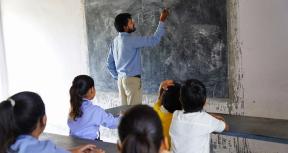Who needs evaluation capacity? Years ago the answer to this question would have been the donor community. This situation has changed dramatically in the last couple of years. Many more countries are setting up evaluation offices as part of their own systems. They – from governments to citizens – want to know how well policies and programs work, whether funded by an external donor or government revenues.
This trend was evident at the Fourth Global Forum of the Regional Centers for Learning on Evaluation and Results (CLEAR) Initiative in Mexico City, where I had the privilege to meet and share ideas with leaders from around the world about their ambition to build evaluation into their systems for managing public sector service delivery, finance, and beyond. It is a demonstration that governments recognize the importance of evidence and greater understanding of development processes. With a capacity to evaluate, countries are able to make better informed decisions – including taking calculated risks – about the management of the public sector as a whole and public finance in particular. Evaluation contributes to increased ownership of development processes, responsible governance, and timely corrective action when policies, programs, or institutions do not perform at their best.
Country ownership and evaluation champions are essential for the process of developing evaluation capacity. These champions can be policy-makers who see the true value of evidence in the decision-making and evaluators as the interlocutors with policy and decision-makers in their countries. They will ensure that evaluation focuses on priority needs and that it is taken into account. Champions are also essential for engaging with the many agencies that aim to develop evaluation capacities identifying the bottlenecks and the additional needs for support. They are the drivers of networks where leaders of strong evaluation functions reach out to debate each other’s challenges and solutions, as well as include peers in countries that just started their journeys in the evaluation capacity world.
Developing capacity involves a diagnostic process that is driven by those local champions. They should be able to call on other leaders in a similar situation and in the evaluation community to help them identify capacity needs and determine gaps and ways to close them, just as took place at the South-South Roundtable in Johannesburg that brought together leaders from Argentina. Benin, Brazil, Colombia, Chile, Costa Rica, Guatemala, El Salvador, Niger, South Africa and Zambia.
Their ownership is essential for creating a shared vision, clear goals and targets, and a monitored, adaptable implementation plan. Implementation will involve typical elements of training, expert advice, and other inputs, and increasingly dialogue among leaders to develop:
- the enabling environment, which both sets the policy or authorizing context and signals demand for evaluation,
- the institutions, which require they understand their clients, develop services, methods systems, and the human, technical, and financial resources to deliver services, and
- people, who need skills, knowledge, and networks to perform at their best.
In recent years the number of evaluation capacity development efforts has exploded. The good news: more attention, more resources. The challenge: generating more and better synergies between these efforts so that they collectively produce more than the parts can deliver individually. Groups like the Development Assistance Cooperation Evaluation Network of the Organisation for Economic Co-operation and Development and initiatives like CLEAR or EvalPartners rally diverse stakeholders around a common goal, which is a good start.
How else to support these efforts?
Fostering an enabling environment for evaluation can take place through dialogue among high-level decision makers and evaluators to increase awareness of and demand for evidence from evaluation. Building evaluation into public sector/finance management programs would give a strong impetus to an enabling environment that asks for and uses critical evaluation findings.
Developing institutions. Take project-related Monitoring and Evaluation units: instead of developing these units as part of a project management structure, they could be used as a platform for developing institutional evaluation capacities as an integral part of the government’s public administration. These units, situated in line ministries, when networked with the national statistical offices would form part of an institutionalized system that generates monitoring and evaluation data for all government investments rather than projects, and feed information into the national statistic system. In addition, it is important to integrate the evaluation data these institutions generate into specific decision-making processes with a clear understanding how evaluation evidence can and should inform choices, and a strategy to ensure evaluation services provide necessary evidence. A network of institutions will ensure that the system overall is efficient and connected with national statistical services.
Building people’s skills and knowledge receives a lot of attention, albeit with short-term measures. To close the demand gap for highly qualified evaluators, a long-term solution lies in investing in tertiary education that incorporates evaluation in faculties such as public administration, both for those who will become policymakers and policy implementers and need to understand evaluation evidence and its use in policy making and implementation, as well as graduate programs for evaluators to equip them with the necessary skills to deliver high quality evaluations. Working with a group of leading universities in partner and client countries to create a network will also help in developing comparable curricula, professional standards, and eventual professionalization of this young profession.








Comments
Add new comment